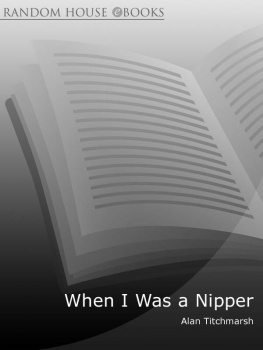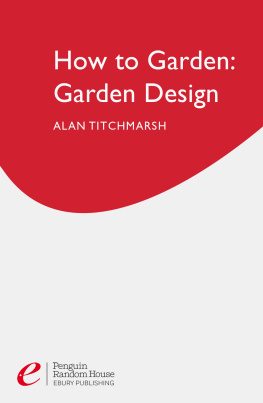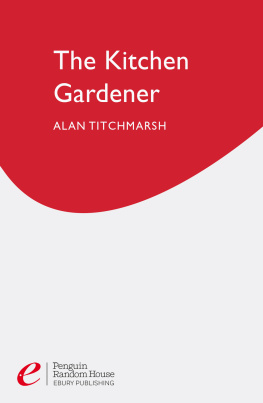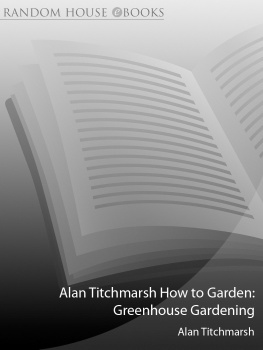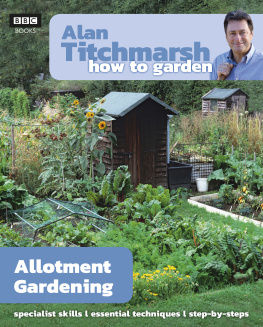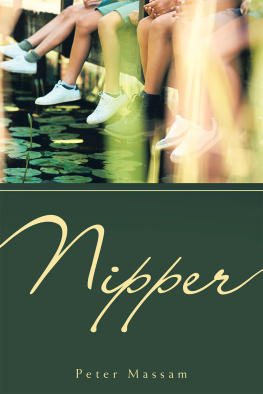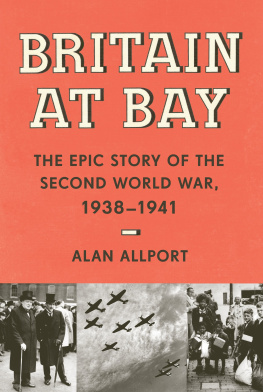Contents
About the Book
Deep down, I suspect, we are just the same people with just the same potential as we ever were. Its just that modern life has blunted our abilities in certain areas. Perhaps we should just take the time to remember what we really valued from our earlier years, and learn to cherish the finer points of our legacy.
Alan Titchmarsh takes us to post-War Britain in search of treasured values and traditions that were once the soul of society. With characteristic wit and warmth he draws on his own experiences, down high streets and through farmyards, onto trolley buses and into local pubs, and asks what can we learn from this era of austerity to make our lives better in the 21st century?
About the Author
Alan Titchmarsh is the author of over 40 gardening books, including: How to be a Gardener: Back to Basics, the fastest-selling of all time in the genre; three bestselling autobiographies - Nobbut a Lad, Trowel and Error and Knave of Spades, and a number of bestselling novels. He also writes for BBC Gardeners World Magazine, the Daily Express and Sunday Express. And well known as a frequent broadcaster, Alan has presented the annual coverage of The Chelsea Flower Show for BBC for 25 years, he has a weekly programme on BBC Radio 2, and hosts his own daily chat show on ITV.
Introduction
Is there any point in nostalgia? I mean, apart from making you feel warm and cosy inside? What good does it do to hark back to days past as though they were times of undiluted joy lived on a diet of milk and honey? And yet carpe diem is all very well, but occasionally it does us good to remind ourselves where we have come from and how we have arrived where we are. It puts our lives into perspective, allows us to compare our lot today with the way it was and be grateful for the improvements. Mostly. But there are those little niggles steam trains and milk with cream on the top that fill us with a hankering for times past, when life seemed simpler, when dad had a gippy tummy not irritable bowel syndrome, and mum would occasionally retire with one of her heads rather than a full-blown migraine.
I wouldnt want you to think that I am a latter-day Luddite. Im the first to admit that modern technology is astonishingly helpful. Well, most of it. It has made it possible for man to walk on the moon (though perhaps once is enough), treat a vast range of medical conditions that were incurable 50 years ago and communicate instantly anywhere in the world by email and mobile phone. The prospect of coping with things as they were for ordinary people in our parents and grandparents lifetime would horrify the majority of us. Imagine trying to run a home without running water, indoor loos or central heating, without supermarkets stocked with convenience foods, or the vast range of labour-saving electrical appliances and home entertainment that we all take for granted today.
But modern advances have come at a cost. Today everyday life is lived at a faster pace. There is tremendous pressure on all of us to achieve. But in the race to better ourselves weve left behind some of the things we once valued respect for authority and our elders and betters, community spirit, family life and good manners. They were we thought the social glue that cemented our society together. They have been replaced, in many instances, by insularity, cynicism and a kind of destructive neurosis. Harsh? Maybe a little, for it is difficult to respect authority, elders and betters when they themselves seem to have forgotten how to behave.
I hesitate to say that things were very different when I was a lad. It makes me sound both ancient and curmudgeonly. But I was born in 1949 and brought up in a Britain that was still recovering from the after-effects of the Second World War. It was a time of relative calm the nation was getting its breath back after a six-year conflict which threatened its very existence. It was enough for most folk to return home at night knowing that the house would still be standing and that daily eventualities allowing the family would be together. The Dunkirk spirit still prevailed, though , since everything from food, clothing, building materials and consumer goods were in desperately short supply. People didnt have television, wall-to-wall carpets or fitted kitchens. Even a fridge and a phone were great luxuries for most folk, and there were still plenty of houses with no mod cons at all.
But we didnt feel hard up we took it for granted that we must make do and mend. From an early age we would be taught to stand on your own two feet, look on the bright side and take knocks on the chin. Well, we did have one vital attribute to see us through; something that no amount of hardship or conflict could quench our sense of humour. We were known throughout the world for our patience, resourcefulness and resilience mustnt grumble was almost a national catchphrase and queuing was second nature. But children could play safely outside in the street, families sat down together at a table for meals, and you never needed to lock your doors. A nice cup of tea solved everything (with an extra spoonful of sugar when things were particularly harrowing), and the weather was our big obsession. So what if the winters were freezing and your house had no heating? You woke up every morning to a fascinating pattern of ice crystals left by Jack Frost inside your bedroom window. You dressed quickly and warmly, in thick sweaters and sensible underwear (washed once a week), had a proper cooked breakfast or a large bowl of porridge laced with golden syrup, and didnt feel the cold. Rose-tinted spectacles? Well, only slightly. We might have yearned for an easier life, but we knew it would be slow coming. Churchills motto applied to us all KBO keep buggering on.
But if youve ever struggled to open the child-proof lid on a jar of aspirins, spent a fruitless hour trying to programme your digital TV, or bemoaned the rising price of bare essentials that our grandparents got by perfectly well without, you may like me sometimes look back wistfully to the old days when the pace of life was slower, and we had our feet far more firmly planted on the ground.
Thrifty housewives were the real heroines of the postwar period, but its incredible how things turn full circle. A good many of grannys tips are proving to be regular recession busters for families today, and a lot of our old ways are making comebacks. Comfort food like steak and kidney pie and good filling puddings such as jam roly-poly are back on pub menus (those pubs that have survived, that is), and fresh locally produced food is on the increase. Long-lasting clothes made of natural fibres are back in fashion, secondhand items are increasingly recycled through charity shops or sold on internet auction sites, and voluntary work in the community or in gardens or nature reserves is a growing trend. Compared to our forebears we are still very much a throwaway society devoted to instant gratification, but maybe some traditional values are reappearing in new guises. Its what happened after the War, and it helped us pull through. Deep down, I suspect, we are just the same people with just the same potential as we ever were. Its just that modern life has blunted our abilities in certain areas. Some of our native aptitudes have been lost through lack of regular use. Perhaps if we remember what we really valued from our earlier years as distinct from blind nostalgia for times past we might find a better and more satisfying way forward. Well, its just a thought. This is, after all, one mans view of what went on and how things were. It may have looked different from where you were standing or where you were born.
Next page
